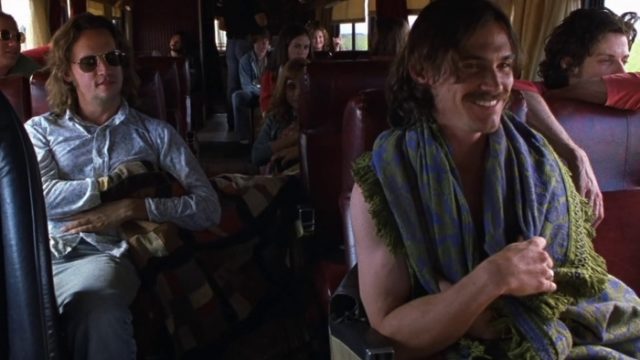Hello, sweethearts! How are you? Anyways, here’s what I found this week….
On the 10th, Richard Phillips of the World Socialist Web Site eulogized the late, great, D.A. Pennebaker and shared a great old article about him:
“D.A. (Donn Alan) Pennebaker, one of the masters of American contemporary documentary filmmaking, died last week, a few weeks after his 94th birthday.
Known as “Penny” to his family and colleagues, Pennebaker leaves behind a legacy of more than 40 films and an enormous archive of raw footage that hopefully will be seen in future releases by Chris Hegedus, his wife and life-long artistic collaborator.”
Valerie Ettenhofer of Film School Rejects, explained the appeal of Almost Famous on the 12th:
“For those who have never had the urge to, say, drop out of college to follow a band, or move to LA to be closer to the stars, the tone and very concept of Almost Famous can be a tough pill to swallow. It helps that the music featured in the film is the type of excellent, sweeping ‘70s rock that myths are made of. Stillwater is a fictional band, and the touring stories consist of a composite of events that reportedly happened when Crowe was writing about The Allman Brothers Band and other musical acts for Rolling Stone.”
Also on the 12th, Keaton Bell talked to Geena Davis on acting an activism over at Vogue:
“After winning her first Oscar in 1988 for The Accidental Tourist, Geena Davis was catapulted to stardom with back-to-back roles in hits like Beetlejuice and Thelma & Louise. In the early aughts, she stepped away from acting—mainly, she says, because the roles lacked complexity and the projects weren’t interesting. Davis decided to set her sights on a new challenge: After observing the way women were narrowly stereotyped and hypersexualized onscreen, she launched the Geena Davis Institute on Gender in Media in 2004 to increase the presence of female representation in film and television. With the institute’s cutting-edge data collection technology that measures how female screen and speaking time is disproportionate to men in film and television, Davis has been quietly revolutionizing the way the entertainment industry approaches gender parity.”
At IndieWire, Hanh Nguyen discussed the surprise of releasing streaming shows, on the 12th:
“At this point, it’s clear that the “surprise release” is a bit of a misnomer. In most cases, some notice must be given to prepare viewers to watch, which is why “Veronica Mars” dropping during the Comic-Con panel created confusion and frustration. Hulu effectively undid the season’s event status and shot itself in the foot.”
13th Steven Hyden shared an exert from the sixth episode of his podcast “Beak Stuff,” about Woodstock ’99: over at The Ringer:
“These stories are awful, each of them, on their own. But for Maureen, there’s another layer to them. At Spin, she had written about feminist Riot Grrl bands and thoughtful male rock stars like Kurt Cobain who sought to dismantle traditional forms of macho rock ’n’ roll. What Woodstock ’99 seemed to suggest is that those efforts had failed.”
On the 14th, Petrana Radulovic of Polygon, talked about the efforts to ban Scary Stories to Tell in the Dark:
“Why are we subjecting our children to this kind of violent material?” Sandy Vanderburg, a Seattle mother of two, asked in a 1993 Chicago Tribune interview. The controversial material in question was Alvin Schwartz’s Scary Stories to Tell in the Dark. ‘If these books were movies, they’d be R-rated because of the graphic violence. There’s no moral to them. The bad guys always win.’ After recounting the plot of ‘Just Delicious,’ about a woman who steals a corpse’s liver to cook and feed to her husband, Vanderburg told the paper, ‘That’s sick.'”
Also of the 14th, Rolling Stones‘ Tim Grierson, argued that cancelling the release of The Hunt was wrong:
“In a sane society, we wouldn’t have a president sounding off on something as minor as an action-horror movie like it was a major catastrophe. And we also wouldn’t have a studio do what Universal did in response, which was surrender.”
Bobby Olivier of Billboard, presented an oral history of Woodstock ’89, which I had never heard of previously, on the 15th:
“In 1969, Woodstock had peace and love. In ‘94, it had mud. In ‘99, fire. In 2019, it had nothing at all.
But what about 1989? The only major anniversary festival to have ever be held at the original farmsite in Bethel, New York — which despite a week’s worth of music, tens of thousands of attendees and a utopian sense of community has been almost completely lost to time?”
Finally, on the 15th, Mike Vanderbilt talked to the guys behind RiffTrax for The Daily Grindhouse:
“Mike Nelson and Kevin Murphy have been making fun of bad movies for over three decades as part of Mystery Science Theater 3000 and now RiffTrax. This August, Mike, Kevin and the gang are taking to the stage for a live riffing of the 1975 regional sci-fi flick, THE GIANT SPIDER INVASION. Mike Vanderbilt chatted with the guys about giant spiders, the work of Don Dohler, and the great land of Wisconsin.”
Enjoy!

